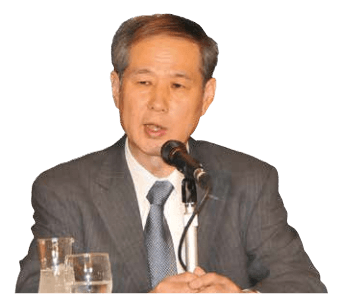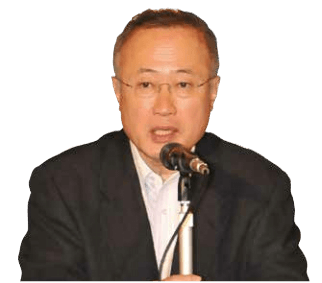Issue:
A RIGHT-WING ACTIVIST AND AN UPPER HOUSE MEMBER FROM THE DPJ FIND COMMON GROUND ON THE NEED FOR HATE SPEECH LAWS
There can be no meaningful discussion about freedom of speech without an examination of hate speech. Venomous and vitriolic, hate speech is the antimatter of communication. Although it is a statement, hate speech runs contrary to the spirit of dialogue from which the right to free speech draws strength. “I may not agree with you,” Oscar Wilde is reputed to have said, “but I will defend to the death your right to make an ass of yourself.”
On July 9, Kunio Suzuki, an outspoken right wing political activist, and Yoshifu Arita, a House of Councillors lawmaker, DPJ member and former journalist, held a press event at the FCCJ to discuss the rise in recent years of incidents of hate speech in Japan, and to explore the question of whether laws should be enacted to censor it.
Both men began by denouncing the recent rash of hate speech in Japan and made clear their desire that the rest of the world should not mistake it for the sentiment of the Japanese people in general. “At these hate speeches and these demonstrations, we see the flag of Japan being flown,” Suzuki said. “It fills me with a renewed sense of grief, because the flag of Japan is weeping at being used in this way.”
The chief offender has been a group that was founded in 2006 called Zaitokukai, or Citizens Against Special Privileges for Koreans. The organization, which claims 13,000 members and has offices in Tokyo’s Akihabara district, organizes protests at which its members chant anti Korean slogans and carry signs calling for violence against residents of Japan with roots on the Korean Peninsula.
Early TV news reports of the protests led some viewers to complain about being exposed to such discriminatory messages. The result has been a vacuum of reporting on the subject in Japan’s domestic media, a worrying scenario because of the feedback loop it creates whereby the lack of public awareness causes politicians to ignore the problem, emboldening similar protests.
“Most Japanese people are unaware that [such demonstrations] are taking place,” Suzuki said. “The television stations have stopped showing this kind of footage, with the idea that eventually this thing will die out. The problem is that the footage is being shown abroad.”
In one YouTube video that has become particularly infamous, a 14 year old Japanese girl can be seen speaking into a microphone in Tsuruhashi, the Korea town of Osaka, in front of a line of police.
Addressing a small crowd in the same crisp way that other kids her age pledge to do their best at the opening ceremony of their school’s sports day, she says: “I hate Koreans so much I can’t stand it . . . if they continue to be so arrogant, it won’t be the Nanking massacre, it’ll be the Tsuruhashi massacre!”
Suzuki is a founder and advisor of Issuikai, a right wing organization established in 1972 that opposes what it sees as the strong role played in Japanese politics by the United States. He believes the Zaitokukai and similar groups have symbiotic connections with the police that allow them to conduct their protests more or less unhindered, while the policeuse such opportunities to look necessary.
There have, however, been signs of change. Lawmaker Kan Suzuki asked Prime Minister Shinzo Abe about the issue in the Diet. Abe responded that the hate speech incidents were “regrettable,” prompting the police to take a tougher stance in recent months.
Arita noted: “When these terrible demonstrations were taking place in ShinOkubo and Tsuruhashi in February this year, people in the vicinity, voluntarily and without any visible leader, started to gather and say, ‘Stop doing things that are so shameful and discriminatory.’ The numbers of counter demonstrators swelled to two or three times those of the demonstrators.”
Despite this and other more concerted efforts, Arita said he does not believe the incidents of hate speech will stop. He called for the Japanese government to adhere to the UN International Convention on the Elimination of All Forms of Racial Discrimination, which it approved in 1995, by following up with legislation to ban hate speech.
Although the government has set up a committee to make recommendations on the matter, its most recent response to those recommendations, which came just this year, was a total denial of the problem. “The conclusion of the Japanese government is that racial discrimination does not exist in Japan,” Arita said.
Given this blanket refusal on the part of the government to look the problem in the face, one has to wonder about the wisdom of entrusting that same goverment with its resolution, whether by leg islative means or otherwise to say nothing of the consequences of granting the state a mandate to censor speech.
Tyler Rothmar is a Tokyo based freelance writer and editor.



